Port 80 connection refused
Solution 1
i did a tcptraceroute 87.106.64.11 80 and its definitely my server that is blocking the port. At some point in the trace i got this:
s18132051.onlinehome-server.info (87.106.64.11) [closed]
So i reset my ip tables, and that did the trick.
So either there where some hidden rule in the table, or iptable -L did not give me all rules. I will mark this as the answer as it fixes the problem.
I would still love to hear, how come i didn't get any blocking rules when doing iptables -L
Solution 2
I experienced the same problem, but on Debian 8.4 (Jessie). Like the above, the solution was the IPTables flush script as listed at http://insanelabs.net/linux/linux-reset-iptables-firewall-rules/. Though iptables reported no rules, there must have been some "hidden" rules, or otherwise a bug in iptables itself. I am reporting this bug to the Debian maintainers.
In case the linked site goes down, here is the full text of the script in question, reproduced here for convenience.
#!/bin/sh
echo "Flushing iptables rules..."
sleep 1
iptables -F
iptables -X
iptables -t nat -F
iptables -t nat -X
iptables -t mangle -F
iptables -t mangle -X
iptables -P INPUT ACCEPT
iptables -P FORWARD ACCEPT
iptables -P OUTPUT ACCEPT
Solution 3
You didn't list all of your rules. I've found a good way to get any active netfilter tables is:
for blah in sudo /bin/cat /proc/net/ip_tables_names; do sudo /sbin/iptables -t $blah -L -vn --line-numbers|sed "s/^/$blah: /" ; done |less -RXF
Another options is to run:
/sbin/iptables-save
If you have the patience, you can go through each rule one at a time and change any DENY targets to ACCEPT and see which one fixes the problem.
Related videos on Youtube
Holger Will
BY DAY: CEO at http://klimapartner.de BY NIGHT: fullstack developer with a wide varity of laguages and frameworks including nodejs, javascript, es6, SQL, SVG, HTML, jquery, polymer, XML, XSLT, dart, .net, couchDB etc. FOR FUN: see BY NIGHT...
Updated on September 18, 2022Comments
-
Holger Will over 1 year
i can not connect to port 80 on my webserver. my iptables are in the default state:
Chain INPUT (policy ACCEPT) target prot opt source destination Chain FORWARD (policy ACCEPT) target prot opt source destination Chain OUTPUT (policy ACCEPT) target prot opt source destinationwhen i start different servers (nginx, nodejs ...) i can make them listen to port 80, but trying to access, i always get "connection refused". Listening to any other port (81,8080 whatever) works perfectly fine. Only port 80 is somehow blocked. Accessing port 80 via localhost does work, so for testing purpose i even switched of the external firewall, still no luck. What can i do to find out who is blocking this port 80?
as requested the output of netstat -tlpn (when running nginx on port 80):
Proto Recv-Q Send-Q Local Address Foreign Address State PID/Program name tcp 0 0 0.0.0.0:21 0.0.0.0:* LISTEN 710/vsftpd tcp 0 0 0.0.0.0:22 0.0.0.0:* LISTEN 1179/sshd tcp 0 0 0.0.0.0:25 0.0.0.0:* LISTEN 1661/master tcp 0 0 0.0.0.0:5984 0.0.0.0:* LISTEN 980/beam.smp tcp 0 0 87.106.64.11:3306 0.0.0.0:* LISTEN 1346/mysqld tcp 0 0 0.0.0.0:80 0.0.0.0:* LISTEN 3274/nginx: master tcp6 0 0 :::22 :::* LISTEN 1179/sshd tcp6 0 0 :::25 :::* LISTEN 1661/master -
mekdigital about 2 yearsI have tried so many things, thanks!!! I believe I put myself in a "broken" state by playing around with Microk8s. I created an ingress for the cluster and that action must have written the hidden rule! I wasted two days :)




